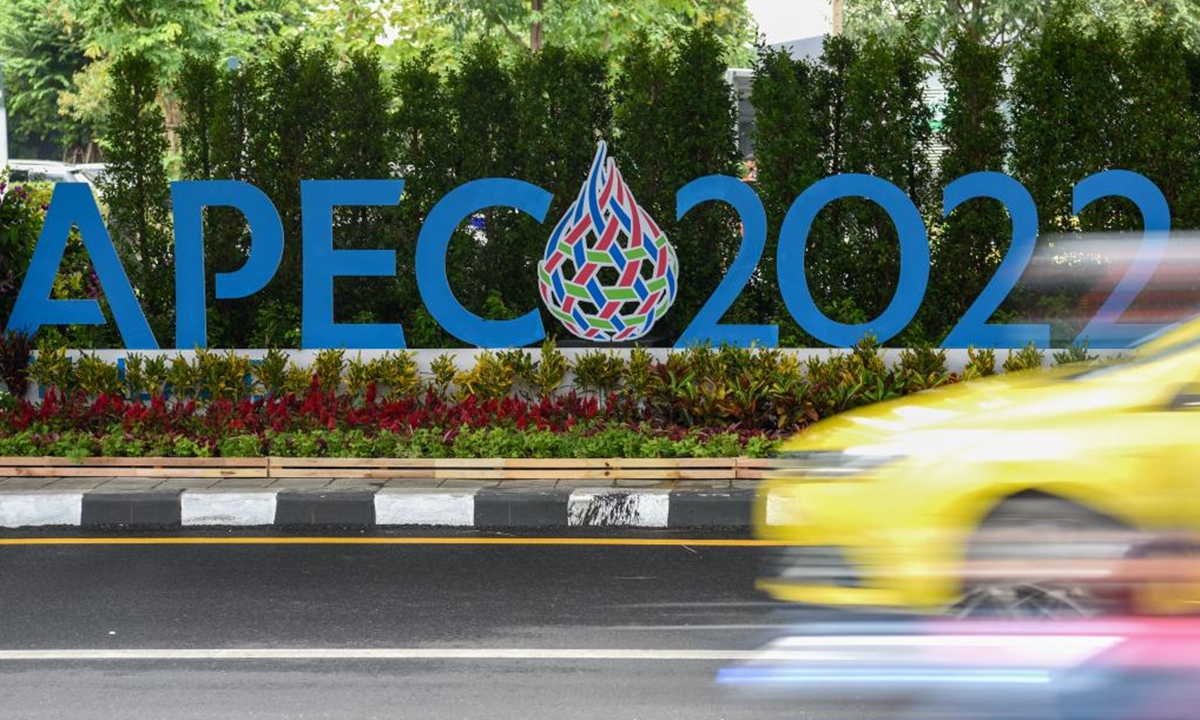Global Times (18 November 2022) – Right after the G20 Leaders’ Summit in Bali concluded on Wednesday, the 29th APEC Economic Leaders’ Meeting will officially start in Bangkok, Thailand, on November 18.
Chinese President Xi Jinping will attend the meeting and deliver an important speech, comprehensively expounding on China’s advocacy in deepening cooperation in Asia-Pacific and promoting regional and global economic growth, which will be a part receiving much of the attention in this years’ meeting.
G20 is the forum for global economic cooperation, and APEC is the highest-level, covering the widest fields and the most influential economic cooperation mechanism in the Asia-Pacific region. Thailand, which hosts this year’s APEC, made the theme of the meeting “Open. Connect. Balance.” It aims at promoting a more balanced and sustainable economic development for Asia-Pacific. This is an important topic with great value and room for discussion.
But similar to the G20, APEC is also facing interference from geopolitical factors. Whether the meeting will be successful or not depends largely on whether all parties can overcome this disturbance and make use of the precious time on the theme. In this regard, the G20 Bali summit has generally done a good job, but judging from the current situation, the US is likely to exert more negative influence on the APEC, which will become an unavoidable uncertainty for the APEC.
US President Joe Biden is absent from the APEC meeting because he was going back to Washington to attend his granddaughter’s wedding. Instead, vice President Kamala Harris will represent the US in the meeting. Kasit Piromya, Thailand’s former foreign minister, said in a recent interview that Biden’s absence would reinforce the perception in Southeast Asia that the US is “too busy, distant and aloof” to effectively engage with Thailand and the broader region. To be honest, Southeast Asians are justifiably disappointed by this, but some American elites have less aboveboard reasons, perhaps even a dark mentality for worrying about disappointing Southeast Asia.
When analyzing the relevant arguments in the US, the pungent smell of the Cold War can immediately be smelt. Some opinions hold that Biden made a mistake by giving China the opportunity to “win the Asia-Pacific,” while other opinions believe that although Biden’s absence is regrettable, it does not mean that the US will give up the economic influence in the Asia-Pacific region, and the US will not give up Asia and let China dominate the economy here.
It is not difficult to see that the “pros and cons” of this debate are both zero-sum game thinking and regarding the Asia-Pacific region as a sphere of influence for which major powers – China and the US – compete. From this perspective, no matter what China proposes or does in the Asia-Pacific region, it may be regarded as trying to compete for influence with the US. This is exactly what we firmly oppose, and also one of the most vigilant risks in the Asia-Pacific region.
A senior Washington official told the US media that Harris in her APEC remarks will reiterate US economic commitments to Asia-Pacific that “there is no better partner for the economies and companies than the United States of America,” underscore US vision for the rules-based international economic order, in a veiled criticism against “China’s economic coercion and debt-trap diplomacy.” If this is the central message that the US will bring to APEC, it is more disappointing than Biden’s absence, as they are all corny clichés, boring with daunting poison.
The Asia-Pacific region is one with the most growth vitality and development potential in the world, but it is not any country’s backyard, and should not become an arena between big powers. It needs to be emphasized that cooperation between China and other Asia-Pacific countries and regions is not exclusive and we certainly welcome constructive contributions from the US to promote regional development. But regarding China ties, Biden’s commitments of “Five Noes” to China are still fresh, Washington officials already engaged in petty actions implicitly or explicitly. They should read these commitments carefully. Otherwise, how can a US without credibility be trusted to be a “good partner?”
The history of the APEC is slightly longer than that of the G20 and China has actively participated in it since the early stage till now. The mutual trust and intertwining of interests formed in the long term won’t be easily sabotaged. If the US thinks Asia-Pacific countries are willing to coordinate with Washington’s strategy with lip service or tiny favors, then it is too conceited and condescending. We hope that the US side can implement Biden’s commitments such as it does not seek a new Cold War or decoupling from China. The APEC venue is the first testing ground to prove US’ credibility.

